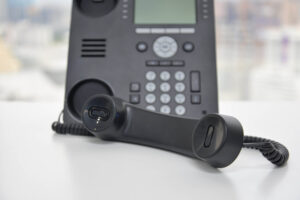 In the increasingly digital landscape of our modern work environments, the priority is no longer just about connecting with your clients and colleagues seamlessly—it’s equally about safeguarding your communications from the barrage of cyber threats. Among the bastions of technology ushering businesses into this new era is Voice over Internet Protocol (VoIP), a system that has revolutionized how companies handle their voice and multimedia communications. This blog post dives deep into VoIP’s role in ensuring security and privacy for businesses, a vital concern as more organizations rely on this technology to conduct daily operations.
In the increasingly digital landscape of our modern work environments, the priority is no longer just about connecting with your clients and colleagues seamlessly—it’s equally about safeguarding your communications from the barrage of cyber threats. Among the bastions of technology ushering businesses into this new era is Voice over Internet Protocol (VoIP), a system that has revolutionized how companies handle their voice and multimedia communications. This blog post dives deep into VoIP’s role in ensuring security and privacy for businesses, a vital concern as more organizations rely on this technology to conduct daily operations.
The Security Imperative in Business Communications
With the rise of cyber-attacks, the traditional phone systems that businesses once relied on as the sole mode of communication are proving notably insufficient in maintaining the confidentiality and integrity of information. Landline systems, operated on Public Switched Telephone Networks (PSTN), are becoming outdated due to their susceptibility to various forms of attacks, including eavesdropping, toll fraud, and call interference.
Enter VoIP, a technology that leverages the robust infrastructure of the internet to protect sensitive data. VoIP’s digital platform not only ensures a higher quality of service but comes with enhanced security features that address the pitfalls of older communication systems.
Key VoIP Security Features
Encryption Protocols
One of the core pillars of VoIP security is the encryption of voice data. Encryption converts the voice signals into indecipherable code, which can only be translated back into its audible format using a decryption key possessed by the intended recipient. VoIP systems typically employ Secure Real-Time Transport Protocol (SRTP) for content encryption and Transport Layer Security (TLS) for signaling encryption, making it exceedingly difficult for unauthorized parties to intercept and comprehend communications.
Authentication Mechanisms
Authentication is the process of verifying the identity of message senders and recipients. For VoIP, this means confirming that the parties participating in a call are indeed who they claim to be. By implementing strong user authentication practices like biometric verification or multifactor authentication (MFA), VoIP systems bar unauthorized access and prevent the adoption of fake or stolen identities in calls and messages.
Firewalls and Intrusion Detection Systems (IDS)
VoIP security is also guarantied through the implementation of firewalls and IDS. Firewalls regulate traffic to and from a private network, deciding what is allowed based on predetermined security rules, which is especially critical in safeguarding against denial of service (DoS) attacks. IDS, on the other hand, are designed to monitor network behavior, identifying and alerting to any abnormal activity that might indicate a potential security threat.
Benefits of VoIP Security for Businesses
Cost-Effective Security Solutions
The integration of comprehensive security features within the framework of VoIP eliminates the need for additional expensive security hardware. By investing in a VoIP system, businesses can enjoy the inherent advantages of encrypted communications without incurring the costs typically associated with separate security measures for traditional phone systems.
Remote Workforce Management
Remote work has become a standard practice for many businesses. VoIP’s security measures are tailored to accommodate this shift, ensuring that employees working from home or on the go can still access secure communication channels, minimizing the risk of data breaches and leaks.
Scalability and Flexibility
VoIP systems are highly adaptable, allowing businesses to scale their communication solutions with their growth. Whether you’re a small startup or a multinational corporation, VoIP’s security features remain a scalable tool, augmenting as needed without reducing the system’s ability to handle an increasing volume of calls securely.
Conclusion: Future-Proofing Business Communications
The landscape of business communications is evolving, and with it, the need to prioritize security is becoming more pressing. VoIP technology’s intricate security infrastructure equips businesses with the assurance that their communications remain confidential. In a world where data is one of the most valuable assets, VoIP’s commitment to security and privacy is non-negotiable, providing a level of protection that a traditional landline system simply cannot match. Organizations that adopt VoIP not only unlock a more cost-effective and flexible communication solution but also safeguard their most critical asset—their information. With VoIP, security and privacy in business communications are no longer a luxury—they are a guarantee. If you have any questions, please contact Advanced Communication Systems today at 800-750-3624. Please feel free to also follow us on Twitter.
